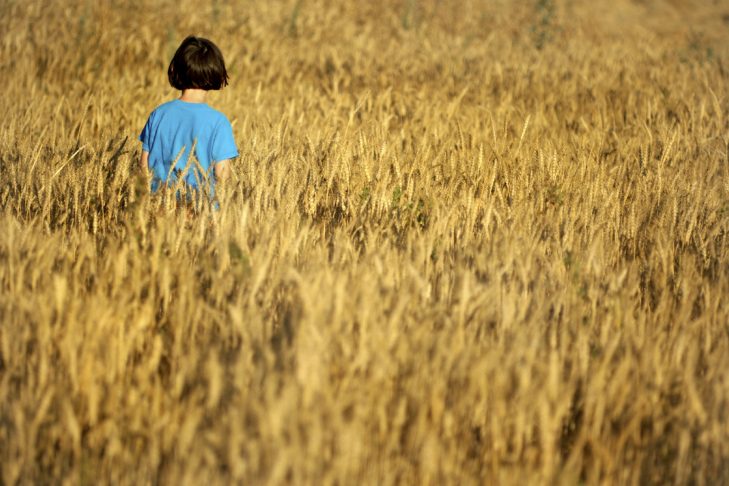To my abuela, my Sephardic-Greek-Cuban grandmother, Shavuot was a woman’s holiday. She dressed in white to celebrate the giving of the Torah and made a bevy of dairy foods, traditional for Shavuot, including cheese bourekas.
But Shavuot has always been complicated for me. Before the Israelites could receive the law of God, Moses said to the men: “Be ready in three days; do not approach a woman.” This admonition makes Shavuot the holiday in which our foremothers were not only banned from Sinai, but effectively exiled from Jewish ritual. But we women never stopped watching and listening and waiting for the moment when Judaism would become wholly ours.
Abuela was a young teenager when she arrived in Havana. She was born in Greece at the dawn of the 20th century and went to a school there funded by the Rothschilds. She learned just enough Hebrew to recite the blessings over the Sabbath candles and did needlepoint to fill in the rest of her life. Family lore claims that she and her siblings made their way to Cuba after Greek soldiers kidnapped her sister. After her father and brothers delivered the ransom on horseback, there was just enough money left for passage to Cuba.
Nobody in Cuba wielded a needle and thread like my abuela. With deft rhythm and mesmerizing patterns, she conveyed a life story of painstaking work and imposed silence through her designs. When she was a young girl she sang Ladino songs in a lilting soprano, but her father forbade her to sing when she turned 12. Kol isha—the voice of a woman—is traditionally banned from any public expression. Abuela stayed silent for many years. As she did she sewed late into the night to make ends meet. In between the sewing jobs she took in from neighbors, she made my mother and my aunt party dresses. Abuela also made her husband and her son’s tallitot—prayer shawls—for which she carefully tied the ritual fringes with sore fingers.
In America, Abuela fashioned a kind of tallit for herself when she pulled the wool shawl she wore year-round closer to her. The few times a year that she ventured to synagogue, she stood when the ark was opened, blowing kisses toward the bimah, or altar, as if greeting a long-lost love. In a hoarse voice she said the Kaddish, or Mourner’s Prayer, even though it was traditionally only said by men. All the while her hand was firmly on my shoulder so that I could not stand up and tempt fate.
When I was 12 my mother lugged home a reel-to-reel tape recorder she had borrowed from the high school where she taught Spanish. She had planned to record Spanish lessons for the kids that she tutored on the side. I took over the recorder and Abuela spent the summer intently watching me pretend I was a reporter. One day I got the idea to interview her. “Talk about anything,” I told her. Recipes, sewing, childhood stories. I wanted to hear all of it. But mostly I wanted her to sing. Abuelo, my grandfather, was more than willing to sing the shacharit, offering the morning liturgy as his personal history. He gathered the tzitzit, or fringes, of his tallit to recite the Sh’ma—Judaism’s central prayer. Eyes closed. Voice pleading. I joined him at the microphone. I was thrilled to sing about loving God with all of my heart and my soul and my strength. I was so caught up in the moment I blurted out that I wanted to be a rabbi.
Abuelo stopped singing and the only sound was the squeaking of the reel-to-reel recorder. He dropped his tzitzit and said, “Eso es muy feo.” (“That is disgusting.”)
Suddenly finding her voice, Abuela said, “She can be anything she dreams.”
There is a midrash, or interpretation, about the Shavuot story that says every Jewish soul—past, present and future—witnessed the giving of the Torah at Mount Sinai. Did the women arrive at Sinai just in time to witness the giving of the Torah? One of my favorite poems, by Merle Feld, is a gorgeous projection of what the women of Sinai were doing the day the Torah was given:
My brother and I were at Sinai
He kept a journal
of what he saw
of what he heard
of what it all meant to him
I wish I had such a record
of what happened to me there
It seems like every time I want to write
I can’t
I’m always holding a baby
one of my own
or one for a friend
always holding a baby
so my hands are never free
to write things down
Maybe these banned women were also doing needlepoint. Or working their fingers to the bone sewing into the night so we, their daughters, could one day learn Torah. Or maybe as the writer and feminist thinker Judith Plaskow says, “It is far easier to read ourselves into male stories than to ask how the foundational stories within which we live have been distorted by our absence.” I want to believe that the difficulties I’ve had with Shavuot have given way to a truer narrative—one in which Abuela and generations of Jewish women have always taken front-row seats to Judaism’s most sacred moments.
This post has been contributed by a third party. The opinions, facts and any media content are presented solely by the author, and JewishBoston assumes no responsibility for them. Want to add your voice to the conversation? Publish your own post here. MORE



